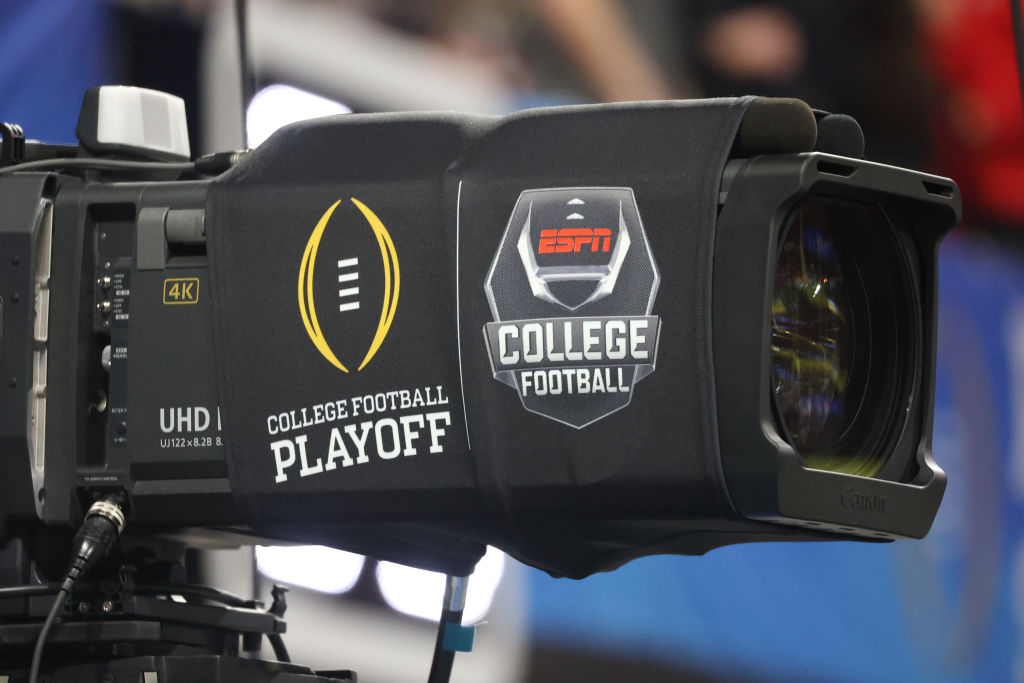After a season full of debate and bloviating, the final year of the four-team college football playoff ended the only way it could for such a stupid sport, with an undefeated conference champion in FSU on the outside looking in as Michigan, Washington, Texas, and Alabama move on for a shot at the title. It was made official Sunday on the weekly, miserable college football ranking show, milking this moment for all it could.
This result was predictable, especially after Georgia blew the SEC championship game. A one-loss SEC champion is too valuable to be left out, especially when that team is Alabama. And of course, since Texas beat Alabama, there’s no way to argue (honestly at least) that Bama should be in but not Texas. And so, Florida State comes out on the losing end of the debate. The four-team playoff began in the 2014 season with a 12-1 conference co-winner in TCU being edged out based on a technicality, and it ends in 2023 with an undefeated conference champion in FSU being edged out based on a technicality. The cycle of life.
This is probably where I need to disclose to you that I am a Florida State alum and fan. I also should disclose that I have not really seen it for this team all year long. Despite the fact that there’s nothing more annoying than a fan complaining about wins, I will say that I have not been particularly impressed with anything they’ve put on the field since drubbing LSU to start the season. The Noles play up or down depending on the competition—they start slow, their play-calling is not exactly progressive or exciting, and I am not the biggest Mike Norvell believer. Even in games he wins, he never looks like he totally knows what's going on. I fully understand people who look at us and think that we are not up to championship par. I also understand that a school was going to get screwed in this situation no matter what. This is the first year in which a substantial number of undefeated and one-loss schools existed.
However. What happened on Sunday is another entry in a catalog of failures committed by the playoff committee during its attempts to create a system in which the "best team in football" can be crowned. College football has always been a chaotic sport—a celebration of college itself, of dumb rivalries and passionate fanbases and petty grievances between schools developed over the years, like the flavor on a Waffle House stove. It has always been as much about politicking as it is about the actual competition and games. It is a sport in which multiple teams at multiple instances have claimed to be and been validated as national champions. It is a sport that depends as much on preseason speculation and recruiting scores as anything that happens on the field. And it is a sport full of favoritism—to schools, cities, conferences, or coaches that generate revenue. The playoff, in its short existence, has both added to the tradition of the sport and taken away from it in different ways, but at the expense of everything else it has primarily been about making the best television show.
This year's failure can be traced back to last season. Georgia beat TCU to a 65-7 pulp in the national title game. It was ugly, it was sad, and even worse for the playoff, it was poorly rated. But that's just how sports go sometimes. The first two games in the playoff were a lot of fun, and that TCU team upset Michigan, which no one saw coming. None of that stopped every single person allowed to gasbag on television or radio about sports for a living from spending an entire year doing just that. Especially on ESPN, partners in the playoff. They hooted and hollered and cried and whined and farted about how the committee made a mistake and ruined the championship game as a result. It's a maddening thing to watch people who don't pay attention to college football until the postseason spend so much time complaining and acting as if blowouts and disappointing championship games aren't a part of every sport. To them, this was the worst thing the committee could do, and it ruined the viability of the championship as an entertainment product, a condition that only college football is expected to worry about to such a degree. You can read FSU's exclusion this year as a direct reaction to TCU's failure last year: the playoff committee was terrified of putting on a bad television show two seasons in a row. If that's how college football wants to govern itself then fine, but the least everyone could do is be honest about it.
The problem with being honest about how this all works is that it requires acknowledging that there is an anti-competitive spirit inherent to the playoff format. It requires acknowledging that the committee can and will make a decision with no prior precedent that flies in the face of ones it has made in the past. It requires acknowledging that they can punish a team on a whim because their quarterback got injured, or they didn't score enough points, or their football games were boring to watch. It turns what should be a competitive endeavor into an actuarial one, where decisions are made based on an arbitrary standard of “best,” which changes depending on what the committee decides is good for their entertainment content.
This is how you end up with a playoff committee openly going against decisions it has made in the past and arguing against merit. You have the typical yakkers arguing that this is the “right call,” and that the committee had to think about the “product on the field,” or that somehow FSU is in some dramatically lesser tier than … what exactly? A Michigan team that would rather run 50 times than trust their QB? A Washington team everyone expected to lose to an Oregon team they already beat once? A Texas team with the worst loss of anyone in the top 10? An Alabama team with a middling offense? But you’d never bet on FSU to beat any of these teams. Wow, you’re telling me a team in the playoff might lose their game? That’s crazy. This was about a television show, and making sure that Alabama was in it and that a low-rated blowout could be avoided if possible; on that level, I can stomach the decision, but any other argument is an insult to all of our intelligence.
At least in the bowl system, everyone understood that the national champion was just an arbitrary title, rather than the product of this ESPN-funded mess that claims to stamp validity onto the proceedings. I'm sure some will argue that the 12-team playoff format will solve today's problems. But just as the four-teamer negated the value of bowls and created an arbitrary fiefdom for a handful of football watchers, the 12-team format will bring its own unique set of problems, particularly with that fiefdom still installed. You know where supposed SEC bias really shows up? In the rankings between 6-15. What’s going to happen the first time a three- or four-loss team inexplicably wins their conference? Are they still automatically in? What happens to an independent like Notre Dame? Are they automatically in with 10 wins every year? What message will that send out? Everyone is afraid of blowouts all of a sudden, but a 12-team playoff will almost certainly be full of those. The television product will get worse, too many people will remain convinced that ratings and revenue are the only reason to stage the games, and college football will end up where it always does: with a bunch of people in a room making political and financial decisions about who has the right to play football.
Correction: An earlier version of this post said that TCU was undefeated in 2014.





